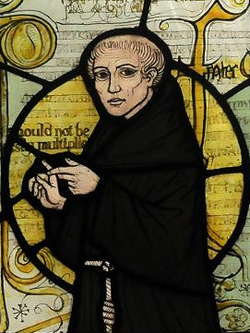
Back Willem van Ockham Afrikaans وليم الأوكامي Arabic وليم الاوكامى ARZ Guillermu d'Ockham AST Vilyam Okkam Azerbaijani Wilhelm vo Ockham BAR Уільям Окам Byelorussian Ўільям Окам BE-TARASK Уилям Окам Bulgarian অকহামের উইলিয়াম Bengali/Bangla
William of Ockham | |
|---|---|
 William of Ockham depicted on a stained glass window by Lawrence Lee at All Saints' Church, Ockham[3] | |
| Born | c. 1287[4] Ockham, Surrey, England |
| Died | 9/10 April 1347[5] |
| Education | |
| Education | Greyfriars, London[7] |
| Alma mater | University of Oxford[8][9] |
| Philosophical work | |
| Era | Medieval philosophy |
| Region | Western philosophy |
| School | |
| Main interests | |
| Notable works | Sum of Logic |
| Notable ideas | |
William of Ockham or simply Occam OFM (/ˈɒkəm/ OK-əm; Latin: Gulielmus Occamus;[11][12] c. 1287 – 9/10 April 1347) was an English Franciscan friar, scholastic philosopher, apologist, and theologian, who was born in Ockham, a small village in Surrey.[13] He is considered to be one of the major figures of medieval thought and was at the centre of the major intellectual and political controversies of the 14th century. He is commonly known for Occam's razor, the methodological principle that bears his name, and also produced significant works on logic, physics and theology. William is remembered in the Church of England with a commemoration corresponding to the commonly ascribed date of his death on 10 April.[14]
- ^ Jaegwon Kim, Ernest Sosa, Gary S. Rosenkrantz (eds.), A Companion to Metaphysics, Wiley-Blackwell, 2009, p. 164: "Buridan, Jean."
- ^ Summa Logicae (c. 1323), Prefatory Letter, as translated by Paul Vincent Spade (1995).
- ^ Brunton, J. (2022). Rogues, Rebels and Mavericks of the Middle Ages. Amberley. p. 425. ISBN 978-1-3981-0441-9. Retrieved 16 June 2023.
- ^ Cite error: The named reference
Larsen2011was invoked but never defined (see the help page). - ^ Cite error: The named reference
Gedeon1982was invoked but never defined (see the help page). - ^ Walker, L. (1912). "Voluntarism". In Catholic Encyclopedia. New York: Robert Appleton Company. Retrieved 27 September 2019 from New Advent.
- ^ Spade, Paul Vincent (ed.). The Cambridge Companion to Ockham. Cambridge University Press, 1999, p. 18.
- ^ Cite error: The named reference
Spade20was invoked but never defined (see the help page). - ^ Cite error: The named reference
Mertonwas invoked but never defined (see the help page). - ^ Longeway, John (2007). Demonstration and scientific knowledge in William of Ockham: a translation of Summa logicae III-II: De syllogismo demonstrativo, and selections from the prologue to the ordinatio. University of Notre Dame. p. 3.
Ockham may reasonably be regarded as the founder of empiricism in the European tradition.
- ^ Jortin, John. Remarks on Ecclesiastical History, Volume 3. p. 371.
- ^ Johann Jacob Hofmann. Lexicon universale, historiam sacram et profanam omnis aevi omniumque... p. 431.
- ^ Wood, Rega (1997). Ockham on the virtues. West Lafayette: Indiana: Purdue University Press. p. 3,6–7. ISBN 1-55753-096-3. Retrieved 20 February 2025.
- ^ "The Calendar". The Church of England. Retrieved 27 March 2021.
Cite error: There are <ref group=lower-alpha> tags or {{efn}} templates on this page, but the references will not show without a {{reflist|group=lower-alpha}} template or {{notelist}} template (see the help page).